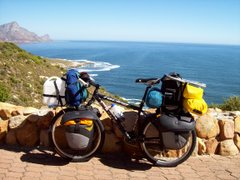



Well, the intention wasn't to cycle through Iran at all. We wanted to take the ferry across the Caspian from Azerbaijan to Turkmenistan, and carry on East from there. We spent a lot of time and effort in Baku to try and organise these things. But, the irregularity of the ferry, as well as visa headaches regarding the "-Stan" countries, made us suddenly change our route. For the first few days' cycling in Iran along the Caspian coast, we were quite surprised to find the area green (rice paddies), with many rivers and forested misty coastal mountains. The people here are also very friendly and helpful, and camping is permitted just about anywhere (we've camped on public beaches, Mosque gardens, and in village people's yards). A problem for us is the strict dress code - I have to wear long pants at all times, and Leana has to wear a head scarf, long pants with a long-sleeved top over it, and long sleeves. (This is not the ideal cycling outfit for hot weather). From the coast we had to cross a substantial mountain pass between Chaluse and Karaj, on our way inland to Tehran. We spent more than a day cycling the 80 k's up the pass to an altitude of 2700 m, and then we cruised down in the drier climate past the spectacular Karaj Dam. There were many tunnels on that road, as well as half-tunnels to protect the road agains rock falls and avalanches in winter. Even although it is mid-summer and very hot, there was still some ice up on the high mountains, and even a glacier near the top of the pass. Tehran is a large, hot (in summer), smoggy city. We've been here for more than a week now, and we've criss-crossed the city by Metro, Bus, and on foot. The traffic is crazy, and the most dangerous thing about the traffic is the thousands of small motorbikes (you're not even safe on the pavement). There is a lot of segregation between women and men, such as separate coaches on the metro for women only, and separate areas on buses. This is clearly a "man's country", with evidence of discrimination against women (i.e. the dress code, and restricted sporting activities, amongst other things). We've been trying to organise things like money and visa's (never-ending), which takes time and requires a lot of patience. Iran's financial system is rather isolated, and our credit cards (which we've used in every other country to obtain cash) are invalid here. Fortunately we had a few dollars with us which we could change, but that didn't last long. Money can also not be sent here from SA. We were lucky to have met a very kind tour operator who forwarded us some cash. This enabled us to settle the bill for our (cheap) hotel room, and to pay for our Pakistan visa's (which is where we'll be heading tomorrow). Between Tehran and the Pakistan border we'll be cycling through some very tough desert and mountainous stretches, and we will have our work cut out for us to get there in the 14 remaining days which we're allowed in Iran. Daily distances cycled since Baku were:- Shirvan 112 km; Celilabad 106 km; Astara 106 km; Jokandan (Iran) 82 km; Hashtpar 90 km; Rushar 125 km; Chaluse 109 km; Sayabishay 70 km; Karaj 92 km; and Tehran 55 km.












